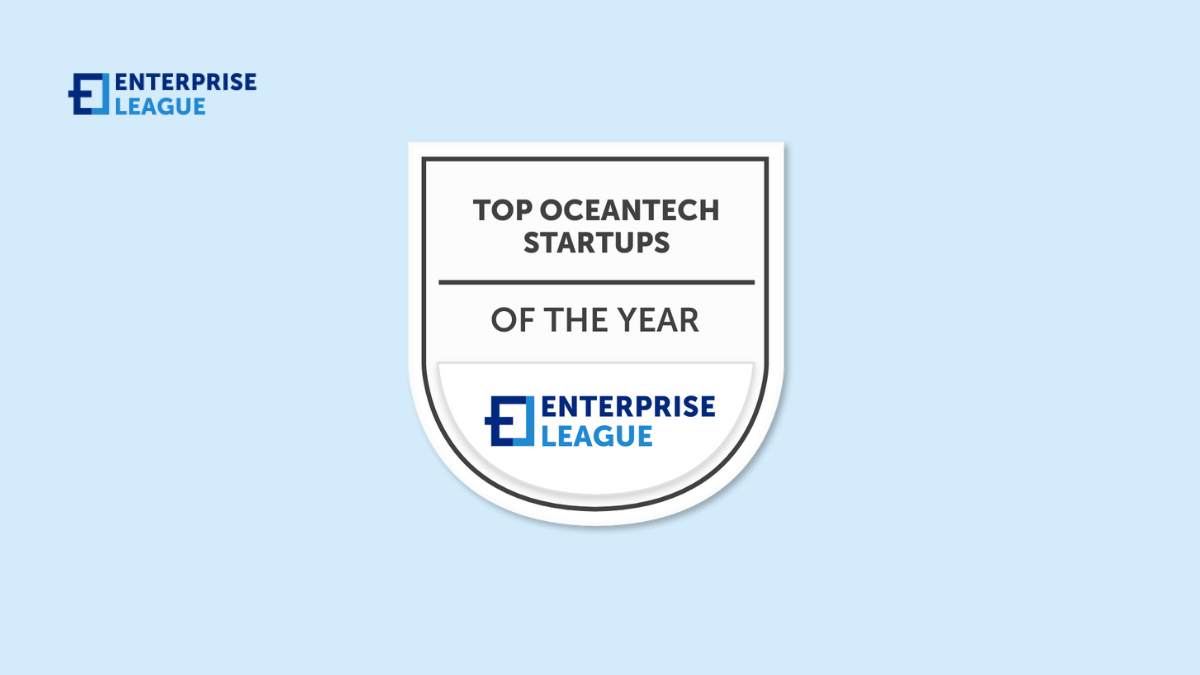Due to environmental concerns, economic opportunities, government support, consumer awareness, and technological advancements, OceanTech startups and renewable energy startups are becoming of vital importance. With a market size expected to reach USD 10.3 billion by 2032, these startups are destined to play a crucial role when it comes to addressing all those pressing ocean-related challenges and creating a more sustainable future.
Whether is developing innovative solutions for renewable energy, marine pollution, aquaculture, or ocean exploration, OceanTech startups are definitely helping us to protect our planet’s oceans and use the potential they offer.
What are OceanTech startups?
Now, you’re probably wondering what actually are OceanTech startups and for which reason they are becoming so popular. Well, OceanTech or BlueTech refers to startups and companies that develop technologies to help protect, study, or sustainably use ocean resources. This field includes several major branches like ocean conservation, sustainable fishing, marine energy, maritime technology, and the ocean’s big data analytics. These technologies are addressing issues like pollution, overfishing, and climate change while exploring new opportunities.
Top OceanTech startups
So, without further ado, let’s see all those new and trending OceanTech startups that are surpassing the competition in no time.
Arc Marine
Founded in 2015, Arc Marine is an ocean technology startup aiming to advance global coral reef restoration. They build specialized equipment for large-scale coral growing and transplantation efforts. Many reefs worldwide face threats from climate change, pollution, and other environmental stressors. Arc Marine partners with conservation groups on technologies tailored to rapidly revive damaged reef systems.
Arc Marine’s data-driven approach boosts outcomes over traditional manual coral farming. By integrating sensors plus salmon robotics to track growth metrics, their nursery systems can raise more vibrant, resilient coral varieties to revive degrading underwater ecosystems.
Sharksafe Barrier
Founded in 2014, Sharksafe Barrier creates underwater fences to keep sharks away from beaches and protected swimming areas. Their barriers deter shark entry while aiming to be eco-friendly at the same time. Sharks are attracted to certain electromagnetic fields and signals. Sharksafe harnesses those natural tendencies to develop high-tech boundaries. Their submerged fences interrupt shark neuroreception through low-voltage electromagnetic pulses.
This confuses a shark’s electroreception and drives them away without harming marine life. Made from environmentally inert materials, Sharksafe offers a reusable shark deterrent that is safe, hidden from view, and operates automatically.
Wave Swell Energy Ltd.
Founded in 2016, Wave Swell Energy has developed a unique technology that converts ocean wave energy into electricity. Their approach uses an artificial blowhole principle, where waves enter a concrete chamber and force air through a turbine to generate power.
The company’s system is designed to be both robust and efficient, capable of withstanding harsh ocean conditions while consistently producing renewable energy. Unlike some other wave energy technologies, their design has few moving parts underwater, reducing maintenance needs and improving reliability.
TCarta
Founded in 2008, TCarta specializes in marine geospatial products and services. They combine satellite technology, artificial intelligence, and advanced mapping techniques to gather data about areas of the ocean that were previously difficult or impossible to survey using traditional methods.
The company’s satellite-derived bathymetry (SDB) technology can measure water depths without the need for expensive and time-consuming boat-based surveys. This is particularly valuable in shallow coastal areas, remote locations, and regions where traditional survey vessels cannot safely operate.
I4Sea
Founded in 2016, I4Sea is a company that provides detailed weather and marine forecasts for the sea and oceans. They use advanced technology to analyze complex environmental data that can improve real-world operations and planning.
Specifically, i4sea creates custom forecasts of wind, waves, visibility, currents and other oceanic conditions. Their predictions help clients who need to account for external marine environments when making decisions – like ship captains planning routes, offshore wind farm operators, and more.
Ashored Innovations
Founded in 2018, Ashored Innovations aims to make commercial fishing more sustainable and environmentally friendly. Their technology addresses some of the most pressing issues facing the fishing industry today, particularly the problem of lost or abandoned fishing gear.
The company’s main innovation is a smart buoy system that helps prevent fishing gear from being lost at sea. This system includes GPS tracking and remote monitoring capabilities, allowing fishers to locate their gear even in harsh weather conditions. The hardware is designed to be durable enough to withstand rough ocean conditions while remaining environmentally conscious.
Samudra
Founded in 2022, Samudra is harnessing the natural carbon-absorbing properties of seaweed. Their innovative approach combines traditional seaweed farming knowledge with cutting-edge technology to create large-scale, sustainable ocean farms. The company’s robotic systems automate many of the labor-intensive aspects of seaweed farming. These robots can plant, monitor, and harvest seaweed with minimal human intervention. AI algorithms help optimize growing conditions by analyzing data from various sensors that monitor water quality, temperature, and seaweed growth rates.
Samudra’s technology makes it possible to farm seaweed in deeper waters and harsher conditions than traditional methods allow. This expansion into previously unusable areas significantly increases the potential scale of seaweed farming, and consequently, carbon capture capacity.
Anemo Robotics
Founded in 2023, Anemo Robotics makes robotic buoys to study how man-made ocean structures impact sea life and biodiversity. Structures like oil rigs, wind farms, and piers can negatively affect marine ecosystems if not properly monitored. Anemo’s autonomous buoys float around these ocean sites and use cameras, sonars, and other sensors to gather data. The solar-powered robots can stay out for months transmitting information on ocean creatures’ movements and behavior changes.
The data Anemo buoys collect helps experts assess habitat disruption and reduce ecological damage. Their tech also monitors erosion and structural fatigue over time catching safety issues before they become bigger problems.
Anchorbot
Founded in 2019, Founded in 2019, Anchorbot has developed technology to install helical anchors in bodies of water using remotely operated robots. Helical anchors are screw-like devices embedded in the ground or seafloor to provide a secure anchor point for buildings, pipelines, docks, and offshore structures.
Installing anchors in water typically requires divers which is complex and limited by depth. Anchorbot’s robotic tools can install anchors on the seafloor down to 100 meters deep from a small boat without any human divers. This allows anchors to be embedded deeper and for less cost than traditional methods.
Minesto AB
Founded in 2007, Minesto is a company developing a new technology called Deep Green to produce electricity from ocean currents. Deep Green uses an underwater kite with spinning rotors to capture the kinetic energy of currents, even those moving at low speeds. As Deep Green is pulled through the ocean by a tethered wing, rotors spin to generate clean electricity that is sent to shore via the connecting cable. This method generates renewable hydrokinetic energy in a cost-effective way from locations unsuitable for other forms of ocean power.
Minesto is working to commercialize and scale up the novel Deep Green system. They have successful testing sites set up in partnerships with communities in Wales, Northern Ireland, and the Faroe Islands. Deep Green electricity will first feed into local electric grids with plans to expand over time.
Seafields Solutions, Ltd
Founded in 2021, Seafields Solutions helps reduce climate change by farming seaweed in the open ocean. They grow large amounts of Sargassum, a type of free-floating seaweed. The seaweed naturally takes in carbon as it grows. Seafields created patented technologies to harvest seaweed efficiently from offshore aquafarms. The harvested seaweed can be processed into products like food, animal feed, and fertilizer. But a key goal is permanent carbon removal.
After seaweed products are made, the remaining carbon-rich plant matter is deposited on the deep ocean floor through pipeline systems. This locks away carbon that was removed from the air by the seaweed for hundreds of years, preventing it from returning to the atmosphere.
SafeWaters.AI
Founded in 2022, SafeWaters.AI is a mobile app that helps predict the risk of shark attacks at beaches worldwide. It uses artificial intelligence trained on over 200 years’ worth of shark data plus current marine weather conditions to forecast shark hazards.
The app provides a 7-day shark forecast for any beach globally. Factors assessed include water temperature, turbidity, tidal activity, and prior shark attacks in the area. SafeWaters combines this historical and environmental data in its predictive models to give beachgoers an overview of the shark attack risk for their location.
Wave Swell Energy Ltd
Founded in 2016, Wave Swell Energy has developed a technology that harnesses power from ocean waves to generate electricity. Their system not only produces clean, renewable energy but it can also function as a seawall or breakwater by protecting shorelines from erosion.
The Wave Swell technology works essentially like an underwater windmill. Its structures capture wave motion which turns rotors to activate generators for electricity production. Because waves provide consistent kinetic energy, the system can turn that mechanical power into an impactful new energy source.
Coral Sunscreen LLC
Founded in 2009, Coral Sunscreen LLC makes a reef-safe sunscreen that aims to help the marine environment while protecting skin. Their product is the first sunscreen formulated to regenerate coral reefs rather than harm them.
Many common sunscreen ingredients like oxybenzone are toxic to fragile ocean ecosystems when washed off swimmers. This causes damage to coral reefs and disrupts the balance of coastal waters. Coral Sunscreen created a patented formula that is both safe for your skin and restorative for reefs.
OceanZ
Founded in 2010, OceanZ is a startup working to gather better data about the health of our oceans. They created a sensor box that can be installed on ships across the global fleet. As vessels travel daily routes, the OceanZ sensor collects information related to ocean health. The sensor boxes measure things like water temperature, acidity, nutrient levels, and pollution.
OceanZ aggregates this data from all its sensors to build a comprehensive database of ocean conditions worldwide. By equipping existing ships with their monitoring gear, OceanZ can cost-effectively scale data collection across vast ocean areas. The sensor data is transmitted back to the OceanZ platform which analyzes it using algorithms and artificial intelligence. This reveals insights into climate impacts and human-caused changes affecting marine ecosystems.
IntelliReefs
Founded in 2017, IntelliReefs is a startup aiming to rehabilitate and improve ocean environments with innovative artificial reef technologies. They create nano-enabled reef structures that can help rebuild struggling underwater ecosystems. Oceans worldwide face challenges like coral destruction and declining biodiversity. IntelliReefs uses advances in nanotech and marine science to engineer reefs that invite the return of native species while also growing food and protecting coastlines.
Their patent-pending reef integration platform anchors reef root structures synthesized with smart nanomaterials for accelerated oyster spat adhesion and coral propagation. By mimicking natural reef textures, IntelliReefs provides the framework for new coral and oysters to take hold.
HydrokinetX
Founded in 2014, HydrokinetX is a company working to provide continuous ocean data collection using renewable energy sources. They have developed systems that are powered by ocean waves and currents, allowing their data-gathering platforms to operate seamlessly at sea. Most ocean data collection today relies on batteries or solar power, limiting how long equipment can monitor without interruption.
HydrokinetX’s marine energy systems harness reliable power day and night from the motion of the oceans themselves. This allows their platforms to conduct persistent ocean, weather, and climate studies over long periods of time. The company deploys its technology off coastal waters, gathering real-time observational data above and below the sea surface through sensors, radars, and other tools. This data goes towards not only improving weather forecasting but also our understanding of climate change impacts.
PescaData
Founded in 2022, PescaData offers software to help small fishing companies and groups operate more sustainably. Their platforms improve data collection and analysis for these important small-scale fishers. Specifically, PescaData systems allow individual fishers and co-ops to better record information on their catch, locations fished, and ocean observations. This data helps identify opportunities to reduce environmental impact and protect marine ecosystems that fishing livelihoods rely on.
The data also assists fishing organizations in making informed business decisions by identifying successful locations and times, as well as potential issues affecting yields or fish stocks. PescaData ultimately aims to promote interoperability and collaboration across the small-scale fishing industry.
SolarDuck
Founded in 2019, SolarDuck is focused on floating solar panels that can be installed offshore in bodies of water. With many countries setting net zero emissions goals, demand for solar power is growing rapidly. However, land space for ground-based solar farms is limited. SolarDuck aims to address this constraint by moving solar panel installations onto floating platforms anchored in lakes, reservoirs, and protected coastal areas.
Their durable floating structures support standard photovoltaic systems while avoiding land usage conflicts. Anchoring the solar arrays offshore removes space limitations and also increases sunlight exposure, boosting power generation. SolarDuck is positioning itself as an innovator in renewable energy systems tailored for the coming boom in over-water solar.
Jaia Robotics
Founded in 2020, Jaia Robotics makes robotic boats called Jaibots for collecting water data. Their small hybrid vehicles can operate underwater as well as on the surface. This allows the Jaibots to gather information throughout the whole water column from top to bottom.
The Jaibots are a fleet of mini robotic vessels that use sensors to take measurements. Because they are low cost and very fast, many Jaiabots can cover a large area at once to quickly build a complete picture of conditions. The data they collect can detect things like temperature, depth, and water chemistry.
Tini Scientific
Founded in 2022, Tini Scientific is the company behind the Clean Oil device which helps clean up oil spills. Clean Oil works differently from other remediation methods, it uses nano filters and a new mechanism to separate crude oil from water. The small device floats on open water, drawing in a water and oil mixture, then utilizing its patent-pending process to strain the oil out. The filtered water is treated and then drained safely back into the ocean, while the oil gets stored in compartments within the recovery unit.
Tini Scientific envisions Clean Oil units being deployed around ports and energy operations worldwide. Wherever oil transport occurs near water, these standby systems could mitigate environmental damage in case of any accidents. Their simple but smart use of nanotech materials packs powerful remediation ability into a compact, scalable device with applications across industries. By making rapid spill isolation and recovery more readily achievable, Clean Oil offers a new approach to protecting water.
Maritimepreneur
Founded in 2021, Maritimepreneur is an organization that aims to advance ocean industries and the sustainable development of ocean resources. They do this through the use of modern digital technologies as well as training, consulting, events, and educational programs.
The oceans contain vast natural resources and economic potential. However overfishing, climate change, and pollution threaten marine ecosystems. Maritimepreneur wants to build solutions that utilize the oceans responsibly while protecting them for the future.
Conclusion
Through innovative technologies and data-driven solutions, these OceanTech startups are not only creating profitable business opportunities but are also advancing ocean conservation efforts. Moreover, as governments worldwide strengthen their commitment to ocean conservation and sustainable blue economy initiatives, these startups are well-positioned to scale their impact.
Discover more creative startups that might interest you:
- Modern furniture startups redefining the interior design concepts.
- Transportation startups offering sustainable solutions.
- Innovative nanotech startups reinventing scientific advancements.
- Top smart city startups that are using technology to solve urban problems.
- Modern B2B startups revolutionizing traditional business approaches.
Related Articles
10 business tips for beginners to help you build a healthy brand
Starting a business can be quite the challenge especially if you’re all new to entrepreneurship. These business tips for beginners will help you set off on the right foot.
SEO writing: Five foolproof tips to secure you the first page
When it comes to SEO writing it’s more guessing and less evidence about what works and what doesn’t. Luckily, we know what can really help you reach the first page.
How to onboard a new employee: Tips for quick integration
Your guide to smoother employee onboarding where you will find practical strategies that help new hires feel welcome and become productive team members faster.
10 business tips for beginners to help you build a healthy brand
Starting a business can be quite the challenge especially if you’re all new to entrepreneurship. These business tips for beginners will help you set off on the right foot.
SEO writing: Five foolproof tips to secure you the first page
When it comes to SEO writing it’s more guessing and less evidence about what works and what doesn’t. Luckily, we know what can really help you reach the first page.








